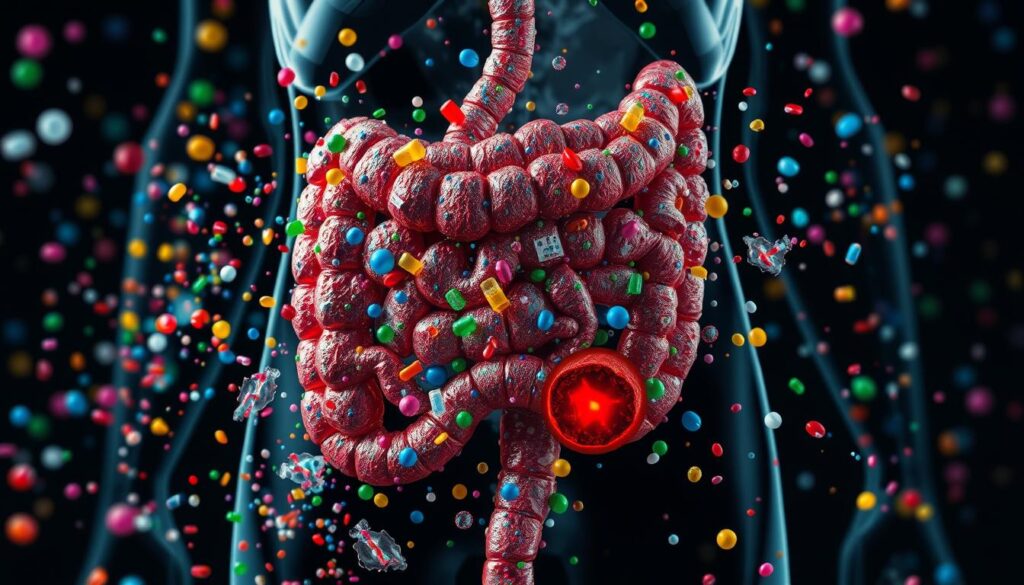How Microplastics May Alter Your Gut Microbiome and Increase Colon Cancer Risk
Date: October 21, 2025
Contributing Authors: Team TRILITY / ACEND
The invisible threat inside your gut
Every day, we unknowingly ingest thousands of microscopic plastic particles—from bottled water, food packaging, synthetic clothing, and even household dust. These particles, known as microplastics, are less than 5 millimeters in size yet increasingly pervasive in the human body. Scientists have already detected them in blood, lungs, and placental tissue. Now, new research suggests their presence in the gut may do far more harm than previously imagined—possibly influencing the microbial patterns associated with colorectal (colon) cancer
New findings from the microONE project
At the 2025 United European Gastroenterology (UEG) Week, researchers from CBmed GmbH and the University of Graz unveiled striking findings from the microONE project. Using human stool samples, the team exposed gut-microbiome cultures to common plastics—polystyrene, polypropylene, polyethylene, polymethyl methacrylate, and polyethylene terephthalate—at concentrations similar to what humans encounter daily.
After only five days, these cultures showed a significant drop in pH (acidity), signaling shifts in microbial metabolism. The researchers also noted changes in bacterial composition resembling those found in individuals with colorectal cancer and depression. Although the work is still preliminary and awaiting peer-reviewed publication, it raises an urgent question: Could everyday exposure to microplastics be silently reshaping the gut ecosystem that guards against cancer?
Why gut pH and microbiota matter
The human gut is home to trillions of bacteria that help regulate digestion, immune function, and inflammatory balance. A healthy microbiome maintains a near-neutral pH and stable metabolic profile. When pH drops—becoming more acidic—it can foster the overgrowth of certain bacteria (e.g., Fusobacterium nucleatum and Bacteroides fragilis) that have been implicated in tumor initiation and progression.
A disrupted microbiome doesn’t just affect digestion—it influences immune surveillance, oxidative stress, and DNA damage repair, all critical factors in cancer prevention. By altering these delicate microbial and metabolic processes, microplastics may create a pro-inflammatory, pro-carcinogenic environment in the colon.
The inflammation connection
Chronic low-grade inflammation—often driven by diet, stress, and environmental toxins—is a hallmark of colorectal cancer. Emerging data show that microplastic exposure can amplify inflammatory signaling, activating pathways like NF-κB and TNF-α, which are already elevated in precancerous lesions.
Animal studies have demonstrated that ingested microplastics can physically irritate intestinal tissue, increase reactive oxygen species (ROS), and damage the gut barrier—allowing bacterial toxins (endotoxins) to leak into circulation. This “leaky-gut” phenomenon promotes systemic inflammation, a known risk factor not only for colon cancer but also for cardiovascular disease, obesity, and neurodegeneration【1–4】.
What the science says so far
While the microONE findings are not yet published, several peer-reviewed studies support their concern:
-
Zhang et al., 2023 (Frontiers in Microbiology): Polystyrene microplastics disrupted gut flora in mice, reducing short-chain fatty acids vital for colon health.
-
Jin et al., 2024 (Environment International): Microplastics increased intestinal oxidative stress and inflammatory cytokines, promoting precancerous cell proliferation.
-
Li et al., 2023 (Environmental Pollution): Chronic microplastic ingestion altered bile-acid metabolism, linking to colon dysplasia.
-
Huang et al., 2022 (Gut Microbes): PET microplastics reshaped human fecal microbiota, reducing beneficial Bifidobacterium and Faecalibacterium prausnitzii.
-
Wang et al., 2022 (Toxicological Sciences): Microplastics triggered epithelial barrier dysfunction and immune activation through ROS-dependent mechanisms.
Together, these findings underscore a disturbing pattern: microplastics aren’t inert—they’re biologically active intruders capable of reprogramming gut biochemistry in ways that mirror early carcinogenic processes.
Environmental exposure is rising
Recent estimates suggest that the average person consumes between 39,000 and 52,000 microplastic particles per year, primarily from food and water. Heating food in plastic containers, drinking bottled water, and breathing indoor air filled with synthetic fibers all contribute to exposure.
The colon, being the endpoint of digestion, acts as a collection site for these particles. Unlike organic compounds, plastics don’t metabolize; they accumulate, potentially embedding in mucosal tissue or interacting with gut bacteria. Long-term exposure—even at low doses—may therefore have cumulative consequences for gastrointestinal health.
ACEND’s perspective: supporting resilience against inflammatory disruption
The connection between microplastics, microbial dysbiosis, and colon inflammation reinforces the central mission behind ACEND® Chronic Inflammation (CI)—to restore balance where modern environments erode it.
ACEND’s formula includes compounds such as:
-
CurcuRouge® (Curcumin): A potent NF-κB and COX-2 modulator that dampens inflammatory signaling.
-
Luteolin and Quercetin: Flavonoids shown to inhibit microplastic-induced oxidative stress in vitro.
-
N-Acetyl L-Cysteine (NAC): Supports glutathione synthesis, mitigating ROS damage from pollutants.
-
Dihydroquercetin and Astaxanthin: Shield colonocytes from oxidative DNA damage.
-
LactoSpore® Bacillus coagulans: Clinically validated probiotic that stabilizes intestinal pH and strengthens barrier integrity.
By targeting inflammatory cascades and promoting microbial balance, ACEND offers evidence-based nutritional support for the very systems most vulnerable to microplastic-related stress.
Building a healthier future through awareness
Although the microONE study highlights early correlations—not causation—it adds to mounting evidence that our environment directly shapes internal biology. Just as air pollution impacts lungs, microplastic pollution may quietly influence gut and colon health.
The takeaways for consumers and clinicians alike are clear:
-
Limit plastic contact with food and beverages (opt for glass or stainless steel).
-
Support gut health with fiber-rich diets, probiotics, and anti-inflammatory nutrients.
-
Stay informed about emerging environmental health research.
As scientists continue to uncover how microplastics interact with our microbiome, functional medical foods like ACEND stand at the intersection of nutrition, detoxification, and prevention—helping the body adapt to 21st-century challenges.
References
-
Zhang Y et al. Front Microbiol. 2023;14:1160207. https://doi.org/10.3389/fmicb.2023.1160207
-
Jin Y et al. Environ Int. 2024;184:108251. https://doi.org/10.1016/j.envint.2024.108251
-
Li D et al. Environ Pollut. 2023;320:121100. https://doi.org/10.1016/j.envpol.2023.121100
-
Huang S et al. Gut Microbes. 2022;14(1):2032145. https://doi.org/10.1080/19490976.2022.2032145
-
Wang X et al. Toxicol Sci. 2022;189(1):89-104. https://doi.org/10.1093/toxsci/kfac062
-
United European Gastroenterology Week 2025 Presentation: microONE Project, CBmed GmbH, Graz (Austria).
Note: Always consult a qualified healthcare professional before making dietary or lifestyle changes or considering any therapeutic food.
